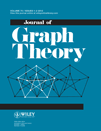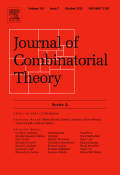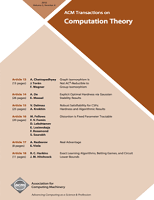
ELECTRONIC JOURNAL OF COMBINATORICS
Scope & Guideline
Fostering Global Dialogue in Combinatorial Research
Introduction
Aims and Scopes
- Graph Theory and Combinatorial Structures:
The journal publishes research on various aspects of graph theory, including graph coloring, connectivity, and extremal graph theory, exploring the relationships between graph properties and combinatorial structures. - Enumerative Combinatorics:
Research focusing on counting techniques, generating functions, and combinatorial identities is prevalent, as authors seek to derive new results and establish connections between different combinatorial constructs. - Algebraic Combinatorics:
This area involves the study of combinatorial structures using algebraic methods, including the use of symmetric functions, representation theory, and algebraic geometry to solve combinatorial problems. - Probabilistic Combinatorics:
The journal features works that apply probabilistic methods to combinatorial problems, addressing topics such as random graphs, thresholds, and probabilistic constructions. - Combinatorial Optimization and Complexity:
Papers that discuss optimization problems, algorithm design, and complexity theory within combinatorial contexts are a significant part of the journal's scope. - Matroid Theory:
The investigation of matroids and their applications in combinatorial optimization, as well as their connections to other areas of mathematics, is a key theme in the journal's publications. - Combinatorial Games and Algorithms:
Research on combinatorial games and algorithmic strategies for solving combinatorial problems, including game theory applications, is frequently featured.
Trending and Emerging
- Interdisciplinary Applications of Combinatorics:
There is a noticeable trend towards applying combinatorial techniques to other fields, such as computer science, biology, and physics, indicating a broader impact of combinatorial research on various scientific domains. - Algorithmic Combinatorics:
An increase in research focusing on algorithmic approaches to combinatorial problems is evident, with authors exploring efficient algorithms and computational complexity as central themes. - Randomized Algorithms and Probabilistic Techniques:
The use of randomized methods and probabilistic models in combinatorial research is on the rise, as researchers seek to leverage these techniques to address complex combinatorial problems. - Complex Network Analysis:
Emerging studies on complex networks, exploring their combinatorial properties and applications in various fields, are gaining prominence in the journal's publications. - Topological Combinatorics:
This area is seeing increased interest, with researchers investigating the connections between topology and combinatorial structures, leading to new insights and results.
Declining or Waning
- Classical Combinatorial Geometry:
Research in classical combinatorial geometry has seen a decline, possibly due to the increasing complexity of problems and the shift towards more algebraic or probabilistic approaches. - Simple Graph Algorithms:
Papers focusing solely on basic algorithms for simple graph problems are becoming less common, as the field evolves towards more sophisticated and nuanced algorithmic strategies. - Traditional Extremal Graph Theory:
While still relevant, traditional extremal graph theory topics may find less emphasis as new methodologies and interdisciplinary approaches gain popularity and prominence.
Similar Journals

JOURNAL OF ALGEBRAIC COMBINATORICS
Unveiling the complexities of combinatorial mathematics.JOURNAL OF ALGEBRAIC COMBINATORICS, published by SPRINGER, stands as a premier resource in the fields of algebra and combinatorics, playing a pivotal role in advancing research in these disciplines. With an esteemed impact factor reflective of its academic rigor, it holds a prestigious Q1 ranking in both Algebra and Number Theory, as well as in Discrete Mathematics and Combinatorics, according to 2023 assessments. Established in 1992, this journal features contributions from leading experts worldwide, offering insights into the latest developments and methodologies. Although not an open-access journal, it provides a wealth of valuable information and research findings focusing on combinatorial structures, theory, and applications that are essential for advancing academic inquiry. As a vital publication for researchers, professionals, and students alike, JOURNAL OF ALGEBRAIC COMBINATORICS continues to shape the conversation within the mathematical community and beyond, making it indispensable for those engaged in the dynamic landscape of mathematical sciences.

JOURNAL OF GRAPH THEORY
Pioneering Research in Discrete Mathematics and CombinatoricsJOURNAL OF GRAPH THEORY, published by WILEY, stands as a pivotal resource in the fields of Discrete Mathematics and Combinatorics, as well as Geometry and Topology. Since its inception in 1977, this esteemed journal has fostered the dissemination of influential research, currently categorized in the prestigious Q1 quartile according to the latest metrics for 2023. With an ISSN of 0364-9024 and an E-ISSN of 1097-0118, it caters to a global readership of researchers, professionals, and students dedicated to advancing their knowledge in graph theory. By maintaining a strong rank in Scopus—39th out of 106 in Geometry and Topology, and 38th out of 92 in Discrete Mathematics and Combinatorics—it reflects its significance and impact within the academic community. Although it does not offer open-access options, its rigorous peer-review process ensures that only high-quality original research is published, thus reinforcing its reputation as a leading journal in this mathematical domain.

JOURNAL OF COMBINATORIAL THEORY SERIES A
Fostering Breakthroughs in Computational Inquiry.JOURNAL OF COMBINATORIAL THEORY SERIES A, published by Academic Press Inc. Elsevier Science, stands as a pivotal platform for researchers in the realm of combinatorial mathematics and theoretical computer science. With an impact factor that underscores its influence and a well-respected reputation reflected in its rapid ascent to Q1 rankings in discrete mathematics and computational theory, this journal serves as a critical resource for academics seeking to advance their understanding of complex combinatorial structures and algorithms.
Founded in 1971, the journal covers a wide spectrum of topics within combinatorial theory, providing a robust forum for innovative research and theoretical advancements until 2025. Including a strong position in the Scopus rankings—notably, it ranks #10 out of 92 in discrete mathematics—the journal is essential for both emerging scholars and established professionals committed to pushing the boundaries of mathematical and computational inquiry. Researchers are encouraged to submit their findings to this esteemed publication, as it offers a non-open-access model that ensures rigorous peer review and high visibility within the academic community.

ACM Transactions on Computation Theory
Exploring the Foundations of Theoretical Computer Science.ACM Transactions on Computation Theory, published by the Association for Computing Machinery, is a prestigious journal dedicated to advancing the field of computation theory and theoretical computer science. With an ISSN of 1942-3454 and an E-ISSN of 1942-3462, this journal serves as a vital resource for researchers and professionals seeking to explore groundbreaking developments in computational models, algorithms, and their mathematical foundations. The journal's rigorous standards have earned it a significant position within the academic community, as evidenced by its 2023 category quartiles, ranking in the Q1 category for Computational Theory and Mathematics and Q2 for Theoretical Computer Science. Although it operates through traditional subscription access, it maintains a critical role in disseminating cutting-edge research and fostering collaboration among experts in the United States and beyond. As an influential platform, ACM Transactions on Computation Theory is committed to contributing to the ongoing dialogue and advancement of computation theory, making it essential reading for anyone passionate about this dynamic field.

Acta Universitatis Sapientiae-Mathematica
Engaging minds in the evolving landscape of mathematics.Acta Universitatis Sapientiae-Mathematica is a dynamic and open-access academic journal published by SCIENDO, dedicated to advancing research in the field of mathematics. With its roots grounded in Germany, the journal has made significant strides in promoting scholarly contributions since it became open access in 2013, enhancing accessibility for researchers, professionals, and students alike. Spanning a broad spectrum of mathematical disciplines, including general mathematics, the journal engages with contemporary challenges and offers a platform to explore innovative approaches. Although currently positioned in the Q4 quartile for 2023 within the miscellaneous mathematics category and holding a Scopus rank of #290 out of 399, the journal is committed to fostering intellectual discourse and enhancing the overall quality of mathematics research. The convergence of research presented since 2014 showcases a journey toward improvement and expanding its influence in the mathematical community. Contribute to the vibrant dialogue in mathematics by exploring the latest findings in Acta Universitatis Sapientiae-Mathematica as it continues to evolve in the academic landscape.

Journal of the Ramanujan Mathematical Society
Advancing Research in the Footsteps of RamanujanJournal of the Ramanujan Mathematical Society, published by the esteemed Ramanujan Mathematical Society, serves as a vital resource for researchers and professionals in the field of mathematics. With an ISSN of 0970-1249 and an E-ISSN of 2320-3110, this journal specializes in disseminating high-quality research and advancements in various domains of mathematics, particularly those that echo the legacy of the renowned mathematician Srinivasa Ramanujan. Since its inception in 2006, this journal has evolved to embrace a diverse range of mathematical topics, striving for excellence as evidenced by its current Q3 ranking in the mathematics (miscellaneous) category for 2023. Although it is not an open-access journal, the Journal of the Ramanujan Mathematical Society remains a cornerstone for those engaged in the academic study of mathematics, as it appears in Scopus with a rank of #343/399. As it continues its publication journey towards 2024, the journal aims to foster a vibrant community of scholars and practitioners who contribute to the evolving landscape of mathematical research.

Annals of Combinatorics
Connecting Theory with Practical ApplicationsAnnals of Combinatorics, published by Springer Basel AG, serves as a premier platform for innovation and research in the field of discrete mathematics and combinatorics. With an ISSN of 0218-0006 and an E-ISSN of 0219-3094, the journal captures the ongoing developments and breakthroughs that characterize this dynamic discipline, which plays a crucial role in various applications such as computer science, optimization, and statistical mechanics. The journal has been recognized as part of the Q2 category in the 2023 rankings for discrete mathematics and combinatorics, reflecting its significant contribution to the academic community. Researchers and educators alike benefit from its insightful articles that not only cover theoretical advancements but also practical implications. With convergence years spanning from 2005 to 2024, the Annals of Combinatorics continues to be an essential resource for anyone looking to deepen their understanding and explore new frontiers in combinatorial research.

Algebra And Discrete Mathematics
Bridging Classical and Contemporary Mathematical TheoriesAlgebra And Discrete Mathematics, published by LUHANSK TARAS SHEVCHENKO NATIONAL UNIVERSITY, is a pivotal academic journal dedicated to exploring the realms of algebra and discrete mathematics. Since its inception in 2012, this journal has contributed significantly to the mathematical community, catering to researchers, professionals, and students interested in advancing their understanding of both classical and contemporary mathematical theories. With categories placed in Q4 in Algebra and Number Theory and Q3 in Discrete Mathematics and Combinatorics, and rankings that place it among various domains with percentiles reflecting its niche status, the journal offers a platform for innovative and high-quality research. While the journal is currently not open access, it maintains a robust academic presence, and its continuous publication until 2024 ensures a steady stream of scholarly discourse. Researchers and academics keen on disseminating their findings or keeping abreast of the latest developments in these mathematical fields will find valuable insights and diverse methodologies within its pages.

Journal of Combinatorics
Elevating Mathematical Discourse in CombinatoricsJournal of Combinatorics is a premier academic journal dedicated to advancing the field of combinatorial theory and its applications. Published by INT PRESS BOSTON, INC, it aims to provide a robust platform for researchers, professionals, and students to disseminate their findings and engage with cutting-edge developments in combinatorics. With a focus on high-quality, peer-reviewed articles, the journal fosters rigorous mathematical discussions surrounding various facets of combinatorial structures, graph theory, design theory, and combinatorial optimization. Although currently not available as an Open Access journal, the Journal of Combinatorics plays a vital role in enriching the mathematical sciences and serves as an essential resource for academics seeking to stay updated with the latest trends in combinatorial research. By maintaining a commitment to excellence and innovation, this journal is indispensable for anyone looking to deepen their understanding in this critical area of study.

Discrete Analysis
Exploring the Depths of Combinatorics and GeometryDiscrete Analysis, published by ALLIANCE DIAMOND OPEN ACCESS JOURNALS, is a pioneering open access journal that has been contributing to the fields of Algebra, Number Theory, Discrete Mathematics, Combinatorics, Geometry, and Topology since its inception in 2016. Based in the United Kingdom, this journal is highly regarded, holding a prestigious Q1 ranking across key mathematical disciplines as of 2023, which underscores its influence and reputation within the academic community. With rigorous peer-review standards and an accessible platform, Discrete Analysis is dedicated to disseminating high-quality research that fosters advancements in mathematical theory and application. By embracing the open access model, the journal ensures that scholarly work is readily available to researchers, professionals, and students alike, promoting greater collaboration and innovation in mathematical research. For up-to-date insights and contributions in the field, Discrete Analysis is an essential resource.